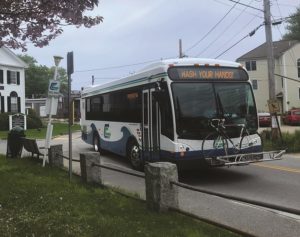Even during the Covid-19 pandemic, the Cape Cod Regional Transit Authority (RTA) is providing rides to 600 to 800 people a day. As one of the only public transit options on the Cape, the RTA has tried creative ways to meet the needs of the community.
“We’re really paying attention to where people want to go, and it’s working,” RTA administrator Tom Cahir said.
The Flex bus typically runs several times a day between Harwich and Provincetown. When the Peter Pan and P&B bus lines canceled their service to the Outer Cape, the Flex bus added stops at health centers and extended its route to Hyannis for passengers needing to get to Cape Cod Hospital.
Cahir said that the RTA tries to dissuade passengers from using its buses except for necessary trips. “A couple of weeks ago,” he said, “when the numbers and hospitalizations were skyrocketing, we were doing all we could to discourage people from using public transit.” Getting to work, the grocery store, or medical appointments are the reasons he listed for passengers to ride the Flex.

And people are taking advantage of the service. Cahir keeps tabs on the number of passengers riding each bus line. Although numbers are down across the board, “Flex has seen the least amount of reduction in service, and more people are riding it than other services,” Cahir said.
Most other lines are seeing a 60- to 80-percent drop in ridership, while the Flex line is closer to a 40-percent reduction. On a recent Saturday, 140 passengers rode the Flex bus, down from the pre-pandemic average of 248 passengers.
Cahir thinks that the Flex remains popular because it’s one of the only ways to get to Provincetown via public transit. “Because of Provincetown’s size, it’s a very important transportation hub,” he said.
The RTA also runs the summer shuttle and trolley in Provincetown, but it is holding off on getting those started again. “We’re still wondering what we’re going to do this summer,” Cahir said. “We’re waiting to hear what the governor has to say.”
Christopher Yazel of Wellfleet was waiting for the Flex bus on a recent Monday. He said that, although he’s worried about getting sick, he rides the Flex frequently to get to Truro. He’s noticed fewer passengers, which he thinks is because people aren’t aware the Flex is operating. “It’s a great thing that the bus is still running,” he said.
Staying Safe on Board
To protect drivers and passengers, Cahir said, all are required to wear masks. Passengers without masks are given one. The RTA has also purchased fogging machines to disinfect the vehicles multiple times a day. Lysol wipes and hand sanitizer are available on buses, which are also getting new shields installed to protect drivers.
“We’ve had nine drivers tested, all negative,” Cahir said. “We attribute that to the aggressive measures we put in place to protect everybody.”
Some drivers have taken leaves of absence out of concern for their health, but Cahir said that layoffs haven’t been an issue. “Most of them have been willing to work,” he said. “They’re phenomenal — they’re the real heroes.”
The RTA has also waived fares for passengers for the past two months, which Cahir said was to decrease driver to passenger contact. The loss in fares has been made up by the federal CARES Act.
“Our operating budget is only 6 percent fares,” Cahir said. “We’re getting a reimbursement from the federal government for the loss of revenue. The CARES Act has meant great things for transit.”
Under the federal relief legislation, the state received $2 billion, with about $1.2 billion for regional transit lines outside the MBTA.
